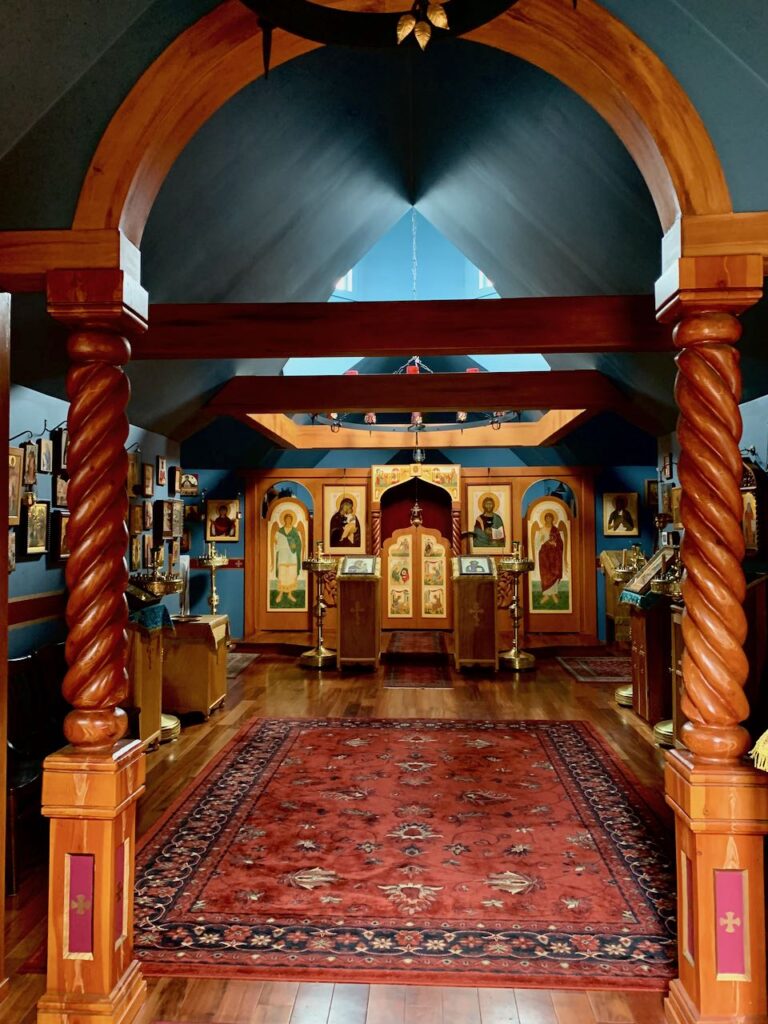Someone Who Knows the Truth but Consciously Rejects It

If we do not believe that Christ’s very Body and Blood are received in the Eucharist, and if we do not believe that the Mother of God remained a virgin before and after the birth of her Son, we are a heretic. If we do not believe in the Two Natures of Christ, and that He is both human and Divine, we are a heretic. If we do not worship God in Trinity, and think all religions are equal, we will have immersed ourselves in heresy, and have departed from the Orthodox Faith.
The Church’s canons require that anyone who believes in, or teaches heresy, must be excommunicated. To participate in the Church’s sacramental life while believing heretical doctrines, endangers a person’s soul, for that person in receiving unworthily, brings down fire upon himself.
Although it is usually the bishop who pronounced someone a heretic, and therefore subject to excommunication, it does not take a bishop, or a priest, to excommunicate an unbeliever. The unbeliever excommunicates himself.
To be fully Orthodox means we believe the dogmatic teachings of the Church, and that we are rightly living and confessing the moral teachings of the Church. But it is more than that. A heretic is someone who knows the truth and consciously rejects it.
In the life of the Church, heresy specifically refers to the realm of the dogmatic teaching of the Church, and not the moral teaching. If we believe it is a woman’s right to choose to abort her baby, it is a moral transgression as opposed to a transgression of belief.
If someone refuses to embrace the dogmatic teachings of the Church, and embraces heretical teachings, in reality they excommunicate themselves. For an excommunicated person to approach the Holy Mysteries is a profoundly dangerous thing to do, and could lead to an eternity whereby they are separated from the Body of Christ.
With love and blessings,
Abbot Tryphon
Friday November 26, 2021 / November 13, 2021
23rd Week after Pentecost. Tone five.
Fast. Food with Oil
St. John Chrysostom, archbishop of Constantinople (407).
Martyrs Antoninus, Nicephorus, and Germanus of Caesarea in Palestine (308).
Martyr Manetha of Caesarea in Palestine (308).
New Martyr Damascene of Mt. Athos (1681).
St. Bricius, bishop of Tours (444) and St. Quintianus, bishop of Clermont (525) (Gaul).
St. Euphrasius, bishop of Clermont (515) (Gaul).
St. Leonien of Vienne (518) (Gaul).
The Scripture Readings
John 10:1-9
Jesus the True Shepherd
10 “Most assuredly, I say to you, he who does not enter the sheepfold by the door, but climbs up some other way, the same is a thief and a robber. 2 But he who enters by the door is the shepherd of the sheep. 3 To him the doorkeeper opens, and the sheep hear his voice; and he calls his own sheep by name and leads them out. 4 And when he brings out his own sheep, he goes before them; and the sheep follow him, for they know his voice.5 Yet they will by no means follow a stranger, but will flee from him, for they do not know the voice of strangers.” 6 Jesus used this illustration, but they did not understand the things which He spoke to them.
Jesus the Good Shepherd
7 Then Jesus said to them again, “Most assuredly, I say to you, I am the door of the sheep.8 All who ever came before Me are thieves and robbers, but the sheep did not hear them.9 I am the door. If anyone enters by Me, he will be saved, and will go in and out and find pasture.
Hebrews 7:26-8:2
26 For such a High Priest was fitting for us, who is holy, harmless, undefiled, separate from sinners, and has become higher than the heavens; 27 who does not need daily, as those high priests, to offer up sacrifices, first for His own sins and then for the people’s, for this He did once for all when He offered up Himself. 28 For the law appoints as high priests men who have weakness, but the word of the oath, which came after the law, appoints the Son who has been perfected forever.
The New Priestly Service
8 Now this is the main point of the things we are saying: We have such a High Priest, who is seated at the right hand of the throne of the Majesty in the heavens, 2 a Minister of the sanctuary and of the true tabernacle which the Lord erected, and not man.
John 10:9-16
9 I am the door. If anyone enters by Me, he will be saved, and will go in and out and find pasture. 10 The thief does not come except to steal, and to kill, and to destroy. I have come that they may have life, and that they may have it more abundantly.
11 “I am the good shepherd. The good shepherd gives His life for the sheep. 12 But a hireling, he who is not the shepherd, one who does not own the sheep, sees the wolf coming and leaves the sheep and flees; and the wolf catches the sheep and scatters them.13 The hireling flees because he is a hireling and does not care about the sheep. 14 I am the good shepherd; and I know My sheep, and am known by My own. 15 As the Father knows Me, even so I know the Father; and I lay down My life for the sheep. 16 And other sheep I have which are not of this fold; them also I must bring, and they will hear My voice; and there will be one flock and one shepherd.
